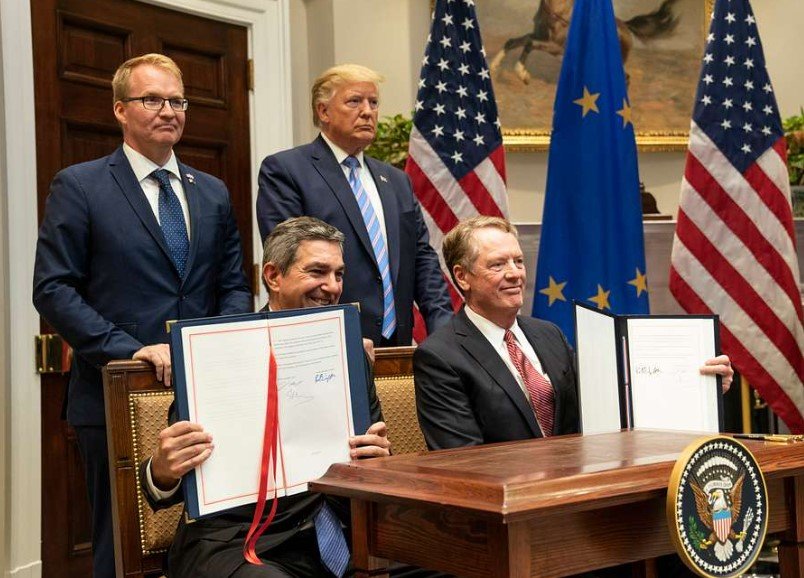Trump’s pressure pays off as Ottawa backpedals on digital services levy, reviving high-stakes negotiations ahead of July deadline
Trade talks between the U.S. and Canada are back on, but not without a sharp detour. Just days after President Donald Trump suspended negotiations in protest of Canada’s proposed digital services tax, Prime Minister Mark Carney’s government folded—revoking the plan that threatened to ignite a new economic standoff.
The Canadian government confirmed the move early Monday, with Finance Minister François-Philippe Champagne announcing that Ottawa would formally withdraw its planned tax on American tech firms. That decision appears to have cleared the path for negotiations to resume—under pressure, and under the clock.
Digital tax fight nearly derailed broader deal
Trump’s fury over the digital services tax was anything but subtle.
On Friday, he took to his Truth Social platform to slam the proposal as a “direct and blatant attack on the United States,” accusing Ottawa of trying to siphon revenue from American innovation. Within hours, he had suspended trade talks entirely.
The move shocked many in Ottawa. The digital tax, which was slated to go into effect June 30, would have impacted large U.S. tech firms operating in Canada, including Meta, Google, Amazon, and Apple. But it was the political framing—more than the financial details—that escalated things.
By Monday morning, Canada had walked it all back.

Carney forced to choose between principle and deal
For Prime Minister Carney, who once served as Bank of England governor and built his political brand on economic competence, the retreat is already proving awkward.
One official from Canada’s Liberal Party told reporters off record that Carney “didn’t want this fight,” especially not with a U.S. president known for unpredictable, retaliatory tariffs.
“It wasn’t worth derailing the entire trade framework,” the official added.
Even Champagne’s formal statement seemed to hedge. It framed the decision as a strategic step, saying Canada “would rescind the Digital Services Tax (DST) in anticipation of a mutually beneficial comprehensive trade arrangement.”
Translation? They blinked.
Still, the Canadian government is presenting the about-face as a temporary pause, not a total surrender.
Trump dangles tariffs, again
Trump didn’t hold back.
In the same post where he suspended talks, he also promised to “impose tariffs on Canadian goods very soon” if the tax wasn’t pulled. This was more than rhetoric—Trump has used trade penalties as his signature weapon before, from steel and aluminum to dairy and softwood lumber.
The message to Ottawa was unmistakable: drop the tax or face economic pain.
-
Canada exports more than $450 billion in goods annually to the U.S.
-
A single round of Trump-era tariffs in 2018 led to more than $16 billion in retaliatory levies from Ottawa
-
U.S. firms make up more than 80% of Canada’s digital ad market
Any renewed tariffs could hammer sectors like auto manufacturing, agriculture, and energy—especially painful as Canada stares down a sluggish post-pandemic recovery.
Here’s how we got to this mess
The DST was initially proposed in 2021, part of a broader international push to force tech giants to pay taxes where they actually do business. The OECD had been working on a multilateral solution. But with talks dragging on and tech revenues booming, countries like Canada, France, and the U.K. started rolling out their own digital levies.
Carney’s Liberals revived Canada’s version in early 2025, insisting it was fair and overdue. But the U.S. had always opposed such taxes unilaterally.
And with Trump now back in the White House, his team took a zero-tolerance line.
“We warned them. They moved forward anyway. So we pulled the plug,” said one senior U.S. trade official who worked on the case. “Now they’re back at the table. That’s progress.”
What happens next?
Both sides now have three weeks to get a deal done.
July 21 is the new soft deadline, with Trump and Carney reportedly aiming for a handshake agreement before Canada’s Parliament recesses for the summer.
Trade analysts say several items are on the table:
-
Revisions to digital revenue-sharing rules
-
Canada’s dairy quotas and agricultural protections
-
Cross-border energy supply guarantees
-
Auto sector incentives and battery manufacturing deals
There’s also talk that Canada may push for formal exemptions or carve-outs to avoid another DST clash in the future.
For now, though, the focus is on patching things up—and doing it fast.
Trade politics meets tech turf war
This wasn’t just about trade. At the heart of it, the clash reflects deeper frustration between U.S. tech firms and global regulators.
Companies like Meta and Google have been pushing back hard on country-specific taxes, especially those calculated on revenue rather than profit. They argue these levies penalize scale and punish innovation. Governments argue it’s about fairness—and funding basic public services.
Carney’s climbdown won’t end that fight. But for now, it’s dulled its sharpest edge.
And for Trump, it’s another moment to flex muscle and claim a win.
